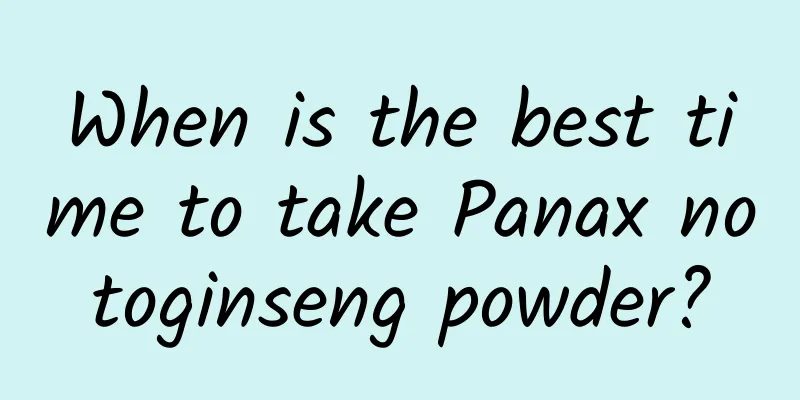Side Effects of Ginseng

|
I believe that many people are familiar with ginseng, but not many people really understand it. The so-called lack of understanding means that ginseng can nourish and strengthen the body, but ginseng also has certain side effects on the human body, because not everyone is suitable for eating ginseng for nourishment. We all know that ginseng has a very good tonic effect. It is very good for people who are recovering from a serious illness or for women who have given birth to children to make soup. As people's living standards continue to improve, their health awareness continues to increase, and more and more people pay more attention to health preservation and nourishing the body. Therefore, many people choose to eat ginseng for food supplement, which leads to some people blindly taking the supplement, resulting in a series of unexpected adverse consequences. What are the side effects of ginseng? Share the following. Generally speaking, the acute toxicity of ginseng is relatively low. Studies have shown that only when mice orally ingest 5 grams of ginseng powder per kilogram of body weight will half of them die. People usually take 3-9 grams of ginseng preparations each time, which generally does not cause acute poisoning. However, some people are sensitive to ginseng. After taking larger doses of ginseng or ginseng preparations, they may experience symptoms of acute poisoning, such as roseola all over the body, fever, headache, dizziness, blurred vision, irritability, chest tightness and shortness of breath. In severe cases, convulsions, seizures, or death from bleeding may be seen. Bleeding is a typical symptom of ginseng poisoning, which can manifest as bleeding gums, nosebleeds, gastrointestinal bleeding, and even cerebral hemorrhage. It is worth noting that newborns and infants are often particularly sensitive to ginseng, and taking 0.5 grams orally at a time may cause acute poisoning. It was reported that in a certain place, the custom was to let newborns take ginseng orally to promote their growth and development. As a result, three cases who took 0.5-1.5 grams of red ginseng orally developed irritability, crying and refusing milk, convulsions, and slow heart rate half an hour to several hours later. One of the cases died after failed rescue efforts. As a tonic medicine, ginseng can enhance the body's nonspecific resistance and has a bidirectional regulatory effect on many important physiological activities of the human body. However, it must be used in moderation. Excessive use often has the opposite effect. For example, small doses of ginseng extract can enhance myocardial contractility, increase cardiac output, dilate peripheral blood vessels, and improve blood circulation. However, large doses of ginseng can cause myocardial paralysis and paralysis of the nerve centers that control vascular movement, resulting in circulatory failure. Ginsenosides are the main components of ginseng. They are similar in structure to corticosteroids and can stimulate the hypothalamus-pituitary-adrenal cortex system. Long-term and high-dose use of ginseng or ginseng preparations may cause symptoms similar to cortisol poisoning, known as "ginseng abuse syndrome." The main manifestations are high blood pressure, nervousness, irritability, insomnia, rash, morning diarrhea, etc. In severe cases, mental confusion may occur. In addition, taking large doses of ginseng may also cause complex and diverse side effects such as depression, loss of appetite, edema, hypotension, amenorrhea, and abdominal distension. Another adverse consequence of taking ginseng is precocious puberty in children. After taking ginseng or ginseng tonics, some children have their first menstruation early for girls, grow beards early for boys, have enlarged penises, and even develop male breasts. This is because ginseng has a gonadotropin-like effect, which can cause children's gonads to develop early and secrete sex hormones, resulting in precocious puberty. This has adverse effects on children's physical and mental health, and deserves the attention of parents and child health experts. Xu Dachun, a famous doctor in the Qing Dynasty, pointed out in his book "On the Use of Medicines as in the Use of Soldiers": "Although licorice and ginseng can cause harm if used incorrectly, they are both poisonous drugs." From the above, we can know that ginseng has certain indications. It is not suitable for everyone and the more the better. It should be taken reasonably and in moderation under the guidance of a doctor. If symptoms of acute ginseng poisoning or "ginseng abuse syndrome" occur, stop using the product immediately and go to the hospital for treatment right away. Newborns and infants should not use ginseng (unless necessary for medical condition) to avoid acute poisoning. In addition, there is the issue of "dietary restrictions" when taking ginseng. Generally speaking, during the period of taking ginseng, it is not suitable to drink tea or eat radish, nor is it suitable to take medicines containing Veratrum, Gleditsia and Aconiti Lateralis. It is not suitable to use an iron pot for decocting, but a casserole is more suitable. People with cold or fever should not take it. The above is a brief introduction to the side effects of ginseng. I believe that through the simple introduction above, everyone has a preliminary understanding and knowledge of the side effects of ginseng. Therefore, you must pay attention to the above points when taking ginseng for tonic. In addition, ginseng should not be taken in large quantities for a long time. If taken for a long time, it may cause abdominal distension, dizziness, fatigue, nausea, etc. |
>>: The efficacy and function of lotus seeds
Recommend
The efficacy and function of black wind vine
Black Wind Vine is a kind of traditional Chinese ...
That Day丨It turns out that Yang Liwei flew into space 20 years ago!
20 years ago today A glorious page in the history...
The efficacy and function of Yinfeng Wheel
Nowadays, our living standards are constantly imp...
Do you always feel that your cat is not right? Be careful...it may be mentally ill
Key Points ★ From a human psychology perspective,...
The first batch of post-95s have already started to suffer from gout...
The pain of gout is enough to make an eagle-like ...
The efficacy and function of Pteris heterophylla
I don’t know if you are familiar with the Fern, a...
The efficacy and function of Xanthium sibiricum foot bath
Foot soaking is the most traditional health-prese...
JUICE: The messenger sent to explore Jupiter's icy moon has set off!
Produced by: Science Popularization China Author:...
Since hydrogen energy is so good, why are we only using it now?
At the opening ceremony of the Winter Olympics tw...
What are the harms of taking Chinese medicine for a long time to the body
Some people may develop medical problems, and lon...
The efficacy and function of Xanthium sibiricum
Traditional Chinese medicine is very helpful in t...
34-year-old anti-cancer internet celebrity passed away! To extend the survival of lung cancer patients, you can learn about these methods
Recently, the hot search topic #34-year-old anti-...
Will AI understand the universe better than humans?
With the ability to quickly and accurately proces...
How to learn Chinese medicine by yourself
Traditional Chinese medicine is the medicine of u...









